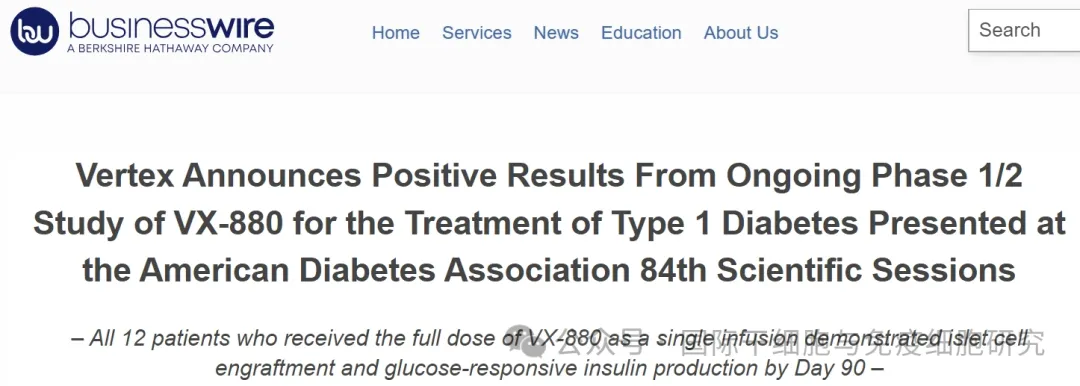
Since she was diagnosed with type 1 diabetes, Ms. S has been suffering from pain. She can only rely on insulin to control her symptoms and always pay attention to changes in blood sugar. For years, Ms. S. and her husband have been awakened at night by a "buzzing" alarm-a warning that her blood sugar is too high or too low. Diabetes disrupted the rhythm of her life and cast a shadow over her future.
Fortunately, she gradually got rid of exogenous insulin dependence after being enrolled in 2023 for reinfusion of islet cells produced by stem cells. Recently, she said in an interview with the Washington Post: "I feel like I'm back to normal again. Looking back on the tranquility of the past year, there were no bezzers, no alarms, and my life has changed."
Cell therapy helps diabetic patients get rid of exogenous insulin dependence!
On February 14, 2023, doctors will restore replacement islet cells cultivated from embryonic stem cells into Ms. S.'s body can regulate blood sugar levels by restoring pancreatic islet cell function and glucose-responsive insulin production. The ability to regulate blood sugar levels has been restored.
Unlike most cells in the body, embryonic stem cells can differentiate into all tissues and organs of the body, from muscles to the brain to the islet cells in the pancreas that produce insulin. In theory, scientists can make as many stem cells as needed, with better control over quality and consistency. This therapy has currently received Advanced Therapy for Regenerative Medicine (RMAT) and Fast Track Certification from the U.S. Food and Drug Administration (FDA) for the treatment of Type 1 diabetes (T1DM) with severe hypoglycaemic events and impaired hypoglycaemic awareness.
In the early stages of cell transfusion treatment, Ms. S needed to take regular medication to prevent the immune system from destroying foreign cells. She developed mouth ulcers as a result, but compared with the health risks of diabetes, these side effects were something she could afford. Fortunately, by the time of re-examination in August 2023, Ms. S's new cells were secreting a large amount of insulin, and she finally got rid of exogenous insulin dependence.
It is reported that Ms. S is one of more than a dozen patients who received full-dose treatment with islet cells produced by laboratory stem cells. According to data released at the American Diabetes Association meeting, 11 patients participating in the clinical study have significantly reduced the amount of insulin or stopped using insulin completely.
American Diabetes Association: Phase 1/2 clinical data are showing initial results, helping patients reduce or get rid of exogenous insulin dependence

▲ The screenshot comes from "businesswire"
The results of this Phase 12 clinical study in which Ms. S participated were simultaneously announced at the 84th American Diabetes Association in 2024. A total of 12 patients with type 1 diabetes with severe hypoglycemia and impaired awareness of hypoglycemia were enrolled in this study. No fasting C-peptide (a marker of endogenous insulin secretion) was detected in these patients, and all had recurrent severe hypoglycemia events in the past. Before enrollment, these patients needed to receive 39.3 units of insulin per day (range 19.8 to 52.0). After enrollment, the results were as follows:
1. Improved blood sugar control
At the most recent follow-up, blood sugar control in all patients (n=12) improved, and during continuous blood sugar monitoring, HbA1c (glycosylated hemoglobin)<7.0%, range time>70%(70 - 180mg/dL) occurred.
2. Severe hypoglycemia events resolved
Starting from Day 90 of treatment, all patients (n=12) experienced resolution or disappearance of the severe hypoglycaemic event (SHE) during the assessment period.
3. Reactive insulin production
All patients (n=12) developed glucose-responsive insulin production and islet cell implantation within 90 days of treatment.
4. Reduce or discontinue exogenous insulin
At the most recent follow-up, 11 patients reduced or stopped using exogenous insulin. Ms. S, mentioned at the beginning, is one of the 11 lucky patients.
Messages
There is currently a lack of effective treatment for diabetes. Patients often need lifelong medication and suffer from complications. In recent years, with the continuous deepening of research on regenerative medicine, researchers are constantly exploring new treatment methods. Many studies have shown that stem cells can improve blood sugar levels by stimulating the regeneration of endogenous beta cells in the pancreas, and can also assist traditional treatment to achieve twice the result with half the effort. For example, Ms. S mentioned in this article, with the help of cell therapy, got rid of it. Exogenous insulin dependence is a major advancement in the field of diabetes treatment and has a milestone impact!
In recent years, my country has also focused on the field of cell research and development, and has successively completed research on the treatment of type 2/type 1 diabetes using pancreatic cells that produce insulin from stem cells and chemically differentiated islet cells!